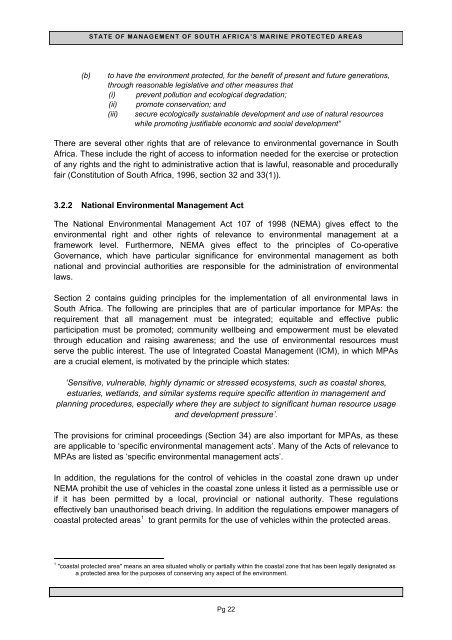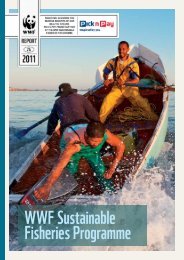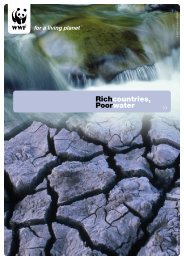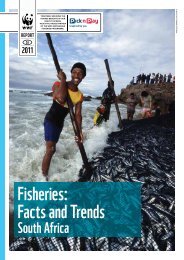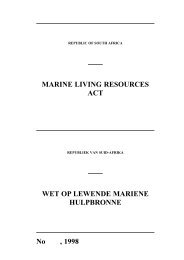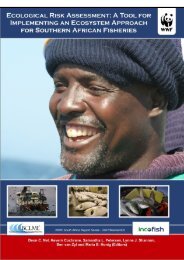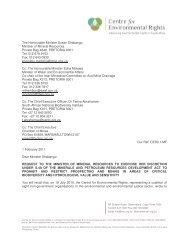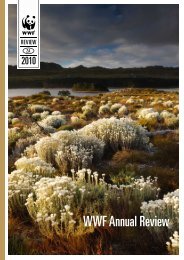State of Management of South Africaââ¬â¢s ... - WWF South Africa
State of Management of South Africaââ¬â¢s ... - WWF South Africa
State of Management of South Africaââ¬â¢s ... - WWF South Africa
- No tags were found...
You also want an ePaper? Increase the reach of your titles
YUMPU automatically turns print PDFs into web optimized ePapers that Google loves.
STATE OF MANAGEMENT OF SOUTH AFRICA’S MARINE PROTECTED AREAS(b)to have the environment protected, for the benefit <strong>of</strong> present and future generations,through reasonable legislative and other measures that(i) prevent pollution and ecological degradation;(ii) promote conservation; and(iii) secure ecologically sustainable development and use <strong>of</strong> natural resourceswhile promoting justifiable economic and social development”There are several other rights that are <strong>of</strong> relevance to environmental governance in <strong>South</strong><strong>Africa</strong>. These include the right <strong>of</strong> access to information needed for the exercise or protection<strong>of</strong> any rights and the right to administrative action that is lawful, reasonable and procedurallyfair (Constitution <strong>of</strong> <strong>South</strong> <strong>Africa</strong>, 1996, section 32 and 33(1)).3.2.2 National Environmental <strong>Management</strong> ActThe National Environmental <strong>Management</strong> Act 107 <strong>of</strong> 1998 (NEMA) gives effect to theenvironmental right and other rights <strong>of</strong> relevance to environmental management at aframework level. Furthermore, NEMA gives effect to the principles <strong>of</strong> Co-operativeGovernance, which have particular significance for environmental management as bothnational and provincial authorities are responsible for the administration <strong>of</strong> environmentallaws.Section 2 contains guiding principles for the implementation <strong>of</strong> all environmental laws in<strong>South</strong> <strong>Africa</strong>. The following are principles that are <strong>of</strong> particular importance for MPAs: therequirement that all management must be integrated; equitable and effective publicparticipation must be promoted; community wellbeing and empowerment must be elevatedthrough education and raising awareness; and the use <strong>of</strong> environmental resources mustserve the public interest. The use <strong>of</strong> Integrated Coastal <strong>Management</strong> (ICM), in which MPAsare a crucial element, is motivated by the principle which states:‘Sensitive, vulnerable, highly dynamic or stressed ecosystems, such as coastal shores,estuaries, wetlands, and similar systems require specific attention in management andplanning procedures, especially where they are subject to significant human resource usageand development pressure’.The provisions for criminal proceedings (Section 34) are also important for MPAs, as theseare applicable to ‘specific environmental management acts’. Many <strong>of</strong> the Acts <strong>of</strong> relevance toMPAs are listed as ‘specific environmental management acts’.In addition, the regulations for the control <strong>of</strong> vehicles in the coastal zone drawn up underNEMA prohibit the use <strong>of</strong> vehicles in the coastal zone unless it listed as a permissible use orif it has been permitted by a local, provincial or national authority. These regulationseffectively ban unauthorised beach driving. In addition the regulations empower managers <strong>of</strong>coastal protected areas 1 to grant permits for the use <strong>of</strong> vehicles within the protected areas.1"coastal protected area" means an area situated wholly or partially within the coastal zone that has been legally designated asa protected area for the purposes <strong>of</strong> conserving any aspect <strong>of</strong> the environment.Pg 22


